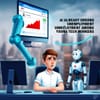Artificial intelligence is significantly impacting the US job market, particularly among young tech workers. According to Goldman Sachs, the tech sector's share of US employment peaked in November 2022, coinciding with the launch of ChatGPT, and has since fallen below its long-term trend.
The unemployment rate for tech employees aged 20 to 30 has risen by nearly 3 percentage points since early 2024, more than four times the increase in the overall national jobless rate. Goldman Sachs predicts AI will displace 6-7% of all US workers, with the peak unemployment impact expected to add a "manageable" 0.5 percentage point to the overall jobless rate.
While AI displaces some jobs, it's also creating new ones. Some experts predict AI will create more jobs than it eliminates, with 170 million new jobs potentially emerging globally by 2030. The impact of AI varies across industries, with some sectors experiencing significant job displacement, while others see new job opportunities emerge.
In India, for instance, 38% of existing core skills are expected to change due to AI. Voice-based customer service agents, chat support, transcription, and data-cleaning roles are at risk due to AI-powered co-pilots and conversational bots. However, workers can prioritize continuous learning and upskilling to remain relevant in an AI-driven job market.
Companies expect employees to work alongside AI, making AI literacy a crucial skill. AI is creating new job titles and career paths, such as AI prompt engineers, AI ethicists, and medical data curators. As the job market evolves, workers and companies must adapt to the changing landscape.


